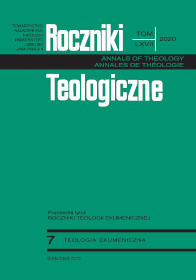Reconciliation Needs Remembrance: The German-Polish Case
Abstract
The paper emphasizes the relationship between reconciliation and remembrance by evaluating examples of German—Polish discourses during the 20th century concerning the intrapersonal, interpersonal, intracultural, intercultural, and transcultural aspects from an ecumenical oriented Lutheran point of view. Based on research about remembrance, reconciliation (and resilience), and on the partnership between Münster and Lublin, it suggests a curriculum of reconciliation oriented remembrance for common projects of ecumenical and transcultural dialogue by sharing experiences and by facilitating rituals, which make them sustainable.
References
Assmann, Aleida. 2011. Cultural memory and Western civilization. Cambridge: Cambridge University Press.
Assmann, Jan, and John Czaplicka. 1995. “Collective memory and cultural identity.” New German Critique, No. 65: Cultural History/Cultural Studies, 125-133.
Assmann, Jan. 2006. Religion and Cultural Memory. Stanford: Stanford University Press.
Erll, Astrid. 2011. Memory in culture. Basingstoke: Palgrave Macmillan
Fivush, Robyn. 2007. “Maternal Reminiscing Style and Children’s Developing Understanding of Self and Emotion.” Clinical Social Work 35: 37–46.
Franzenburg, Geert. 2012. “Distance, Remembrance, Tolerance: European Remarks.” Problems of Education in the XXI Century 47: 40–49.
Franzenburg, Geert. 2013. “Displaced Values: From Remembrance To Resilience.” Problems of Education in the XXI Century 56: 59–65
Franzenburg, Geert. 2015. “Remembering rituals and rules.” Trimda Forum 4 (self-publishing).
Franzenburg, Geert. 2016a. “Der Bischof und die Nonne [The bishop and the nun]. Roczniki Teologiczne 43, z. 7: 195–206.
Franzenburg, Geert. 2016b. “Erinnertes äußern (expressing memories).” Europa-Forum Philosophie 65: 85–100
Franzenburg, Geert. 2016c. “How to draw benefit from remembrance.” Trimda Forum 5 (self-publishing)
Glaser, Barney G., and Anselm L. Strauss. 1967. The discovery of grounded theory. Chicago: Aldine Transaction.
Troebst, Stefan. 2005. “Jalta versus Stalingrad, Gulag versus Holocaust.” In Stefan Troebst. Postkommunistische Erinnerungskulturen im östlichen Europa (post-communistic memories in Eastern Europe). Wroclaw: Wroclaw University Press.
Welzer, Harald. 2008. “Communicative Memory.” In Cultural Memory Studies, edited by Astrid Erll and Ansgar Nünning, 285–98. Berlin: De Gruyter.
Copyright (c) 2020 Roczniki Teologiczne

This work is licensed under a Creative Commons Attribution-NonCommercial-NoDerivatives 4.0 International License.





